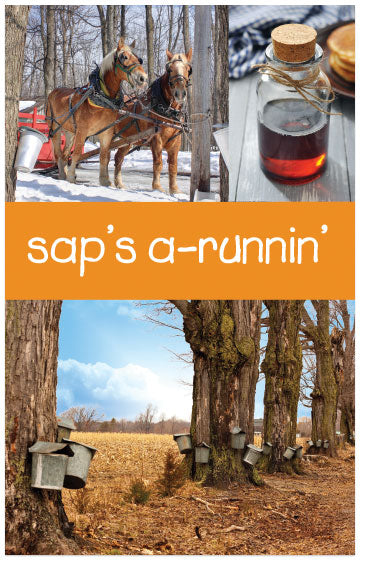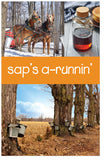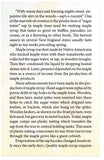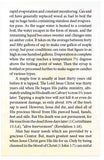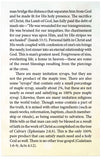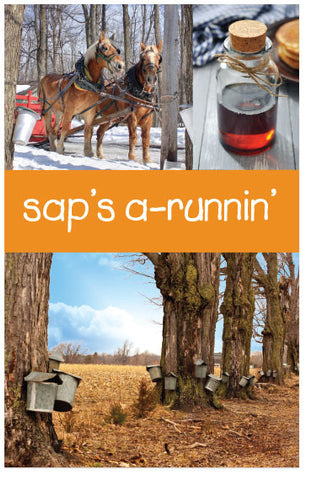Sap's A-Runnin' (NKJV)
Special-Order Folded Tract
 NOTE: This item is custom-printed to order (click for more details).
NOTE: This item is custom-printed to order (click for more details).
This tract is from our print-on-demand library, and is not kept in stock. Select the options below, and we will custom-print a batch just for you. Because this item is custom-printed, you can add your custom imprint to the back page at no extra cost.
- Estimated shipping date: Monday, January 12 (Click for more details)
- SKU:
- Discounts: Discount coupons do not apply to this item
- Format: Folded Tract
- Size: 3.5 inches x 5.5 inches
- Pages: 6
- Imprinting: Available with 5 lines of custom text
- Version: NKJV
- Returns: Because this item is custom-printed to order, it cannot be returned.
Show all item details
The full text of this tract is shown below in the NKJV version. (Do you want to print this tract in a different version than the one listed? Contact us and let us know what you're looking for—we may be able to create the alternate version for you at no charge.)
“With warm days and freezing nights sweet, impulsive life stirs in the woods—sap’s a-runnin’.” One of the marvels of creation is the production of “sugar water” sap in maple trees used for making maple syrup that tastes so good on waffles, pancakes, ice cream, or as a flavoring in other foods. The harvest season in several New England states usually lasts eight to ten weeks preceding spring.
Maple syrup was first made by Native Americans who hacked maple trees with their tomahawks and collected the sugar water, or sap, in wooden troughs. Then they condensed the liquid by dropping heated stones into it. Later, pioneers depended on the maple trees as a source of income from the production of maple products.
Many advancements have been made in the production of maple syrup. Hand augers were replaced by power drills to tap holes in the maple trees. Wooden, and then later, metal spiles were inserted into these holes to catch the sugar water which dripped into keelers, or buckets, which also hung on the spiles. Wooden keelers, as shown on the front picture, were first used, but gave way to metal buckets. Today, maple sugar camps use plastic tubing which transfers the sap from the tree to central holding tanks. This maze of plastic tubing crisscrosses its way from tree to tree through the maple grove like a giant cobweb.
Evaporation of the sap has also changed drastically since the early days. Quality maple syrup requires rapid evaporation and constant monitoring. Gas and oil have generally replaced wood as fuel to boil the sap in huge tanks containing stainless steel evaporator pans. As the sugar water is heated to a constant boil, the water escapes in the form of steam, and the remaining liquid becomes sweeter and changes into an amber color. It takes on the average between forty and fifty gallons of sap to make one gallon of maple syrup, but poor conditions can raise that figure to as high as one hundred gallons. Evaporation is complete when the syrup reaches a temperature 7½ degrees above the boiling point of water. Then the syrup is bottled or processed further to make sugar or candies of various types.
A maple tree is usually at least thirty years old before it is tapped. The Lord Jesus Christ was thirty years old when He began His public ministry, ultimately ending in His death on Calvary’s cross 3½ years later. Tapping a maple tree will not kill it or even do permanent damage, as only about 10% of the tree’s sap is used. However, Jesus did die, and shed all of His precious blood from His pierced head, hands, feet and side. But His death was not permanent, for He rose from the dead three days later (1 Corinthians
15:3,4), “alive forevermore” (Revelation 1:18).
Man has many needs which are provided by a gracious Creator. But, man’s greatest need was met when Jesus Christ gave His life for us. Only by being cleansed in the blood of Christ (1 John 1:7) can sinful man bridge the distance that separates him from God and be made fit for His holy presence. The sacrifice of Christ, the Lamb of God, has fully paid the debt of man’s sin—“He was wounded for our transgressions, He was bruised for our iniquities; the chastisement for our peace was upon Him, and by His stripes we are healed” (Isaiah 53:5). Personal faith in Christ and His work coupled with confession of one’s sin brings the needy, lost sinner into an eternal relationship with God. This is man’s greatest need. Forgiveness of sins, everlasting life, a home in heaven—these are some of the sweet blessings resulting from the piercings at the cross.
There are many imitation syrups, but they are not the product of the maple tree. There are also some “syrups” that contain only a small percentage of maple syrup, usually about 2%, but these are not nearly as sweet and satisfying as 100% pure maple syrup. Likewise, there are many imitation religions in the world today. Though some contain a part of the truth, it is mixed with other ingredients (such as man’s works, reformation, baptism, church membership or rituals), as being essential to salvation. The Bible tells us that man can only be blessed as a result of faith in the work of Christ accomplished on the tree of Calvary (Ephesians 2:8,9). This is the only 100% pure product that can satisfy man’s need and a holy God as well. There is no other true gospel (Galatians 1:6-9; Acts 4:12).
No advancements or changes are required for the death of Christ to atone for the sins of men today. The need of man remains the same as it has been since Adam sinned. Man has improved the way of making maple syrup over the years, but when he attempts to devise his own way of salvation and changes, seeks to modernize, or ignores altogether the Word of God, he destroys the gospel. “There is a way that seems right to a man, but its end is the way of death” (Proverbs 16:25).
Some maple trees have been tapped for two hundred years. Many generations have enjoyed the sweetness of the same tree just as many millions have benefited from the finished work of Christ accomplished about two thousand years ago. Maple trees have to be pierced each year, but Christ does not need to be wounded ever again. “This man [Christ], after He had offered one sacrifice for sins forever, sat down at the right hand of God … For by one offering He has perfected forever those who are being sanctified” (Hebrews 10:12,14). Thus, when a sinner is converted, he finds that not only is he forgiven, but his life is sweetened each day by the presence of His Saviour.
“Every day with Jesus is sweeter than the day before.
Every day with Jesus I love Him more and more.
Jesus saves and keeps me, and He’s the one I’m waiting for.
Every day with Jesus is sweeter than the day before.”
There is only a short period of time that the sap runs for syrup production. God’s period of grace wherein He freely offers salvation will also soon be past. It ends for each individual at death (Hebrews 9:27), or at the return of the Lord Jesus Christ
(1 Thessalonians 4:16,17). According to the prophetic teachings of the Bible which are mirrored by events in today’s world, this will be very soon. Our counsel would be to trust as your personal Saviour today the One who was “wounded for your transgressions” while the sap is still “a-runnin’,” while it is still the day of salvation (2 Corinthians 6:2). Tomorrow the “harvest season” may be over, and the bitter realization of a lost eternity will have just begun for everyone who has rejected Christ.—T.M.J.
“Oh, taste and see that the Lord is good; blessed is the man who trusts in Him!.” (Psalm 34:8)

